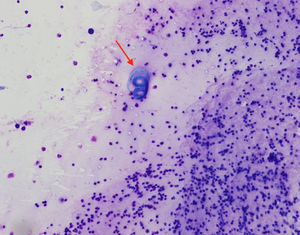A 32-year-old Guatemalan female presented to our Institution with dyspnea, dull chest pain, nonproductive cough, and diffuse pruritic rash. She reported that her symptoms had aggravated over the previous week. She has Acute Lymphoblastic Leukemia treated with cyclophosphamide, vincristine, doxorubicin, and dexamethasone that was last administered three weeks prior to presentation.
Upon arrival, she had tachycardia at 112 beats per minute, WBC 20,680/L, Hemoglobin 9.0 g/dL, ALT 56 units/L, Lactate Dehydrogenase 358 units/L. Imaging revealed no acute infectious findings. Despite starting broadspectrum antibiotics and steroids, her dyspnea progressed and she required oxygen support. Repeat labs revealed WBC 21,570/L with eosinophils of 1730/L. Bronchoscopy was conducted and bronchoalveolar lavage revealed Strongyloides (Figure 1).
Pathology confirmed Strongyloides stercoralis. Antibiotics and steroids were discontinued. Ivermectin 200 mcg/kg was initiated.1 Repeat BAL after two weeks of Ivermectin revealed no signs of infection. Chemotherapy was resumed after four weeks of Ivermectin. Interestingly, her stool for ova and parasite and IgG for Strongyloides stercoralis were negative.
Parasitic infections including Strongyloides stercoralis should be considered in immunocompromised patients with eosinophilia that don't improve with broad-spectrum antibiotics.






